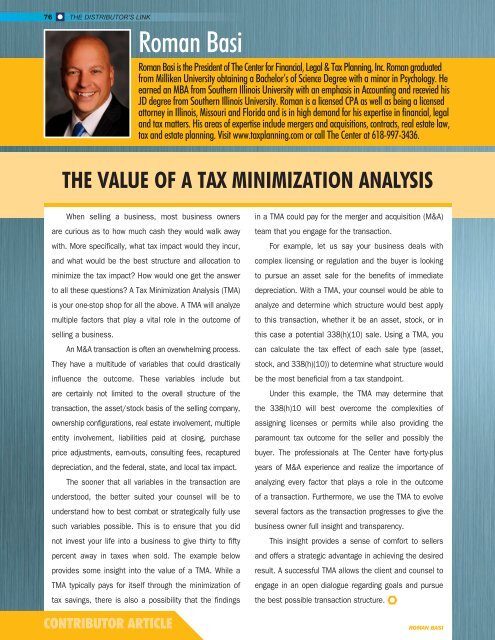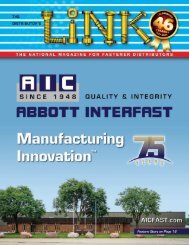WINTER 2024
Distributor's Link Magazine Winter 2024 / Vol 47 No 1
Distributor's Link Magazine Winter 2024 / Vol 47 No 1
You also want an ePaper? Increase the reach of your titles
YUMPU automatically turns print PDFs into web optimized ePapers that Google loves.
76<br />
THE DISTRIBUTOR’S LINK<br />
Roman Basi<br />
Roman Basi is the President of The Center for Financial, Legal & Tax Planning, Inc. Roman graduated<br />
from Milliken University obtaining a Bachelor’s of Science Degree with a minor in Psychology. He<br />
earned an MBA from Southern Illinois University with an emphasis in Accounting and recevied his<br />
JD degree from Southern Illinois University. Roman is a licensed CPA as well as being a licensed<br />
attorney in Illinois, Missouri and Florida and is in high demand for his expertise in financial, legal<br />
and tax matters. His areas of expertise include mergers and acquisitions, contracts, real estate law,<br />
tax and estate planning. Visit www.taxplanning.com or call The Center at 618-997-3436.<br />
THE VALUE OF A TAX MINIMIZATION ANALYSIS<br />
When selling a business, most business owners<br />
are curious as to how much cash they would walk away<br />
with. More specifically, what tax impact would they incur,<br />
and what would be the best structure and allocation to<br />
minimize the tax impact? How would one get the answer<br />
to all these questions? A Tax Minimization Analysis (TMA)<br />
is your one-stop shop for all the above. A TMA will analyze<br />
multiple factors that play a vital role in the outcome of<br />
selling a business.<br />
An M&A transaction is often an overwhelming process.<br />
They have a multitude of variables that could drastically<br />
influence the outcome. These variables include but<br />
are certainly not limited to the overall structure of the<br />
transaction, the asset/stock basis of the selling company,<br />
ownership configurations, real estate involvement, multiple<br />
entity involvement, liabilities paid at closing, purchase<br />
price adjustments, earn-outs, consulting fees, recaptured<br />
depreciation, and the federal, state, and local tax impact.<br />
The sooner that all variables in the transaction are<br />
understood, the better suited your counsel will be to<br />
understand how to best combat or strategically fully use<br />
such variables possible. This is to ensure that you did<br />
not invest your life into a business to give thirty to fifty<br />
percent away in taxes when sold. The example below<br />
provides some insight into the value of a TMA. While a<br />
TMA typically pays for itself through the minimization of<br />
tax savings, there is also a possibility that the findings<br />
CONTRIBUTOR ARTICLE<br />
in a TMA could pay for the merger and acquisition (M&A)<br />
team that you engage for the transaction.<br />
For example, let us say your business deals with<br />
complex licensing or regulation and the buyer is looking<br />
to pursue an asset sale for the benefits of immediate<br />
depreciation. With a TMA, your counsel would be able to<br />
analyze and determine which structure would best apply<br />
to this transaction, whether it be an asset, stock, or in<br />
this case a potential 338(h)(10) sale. Using a TMA, you<br />
can calculate the tax effect of each sale type (asset,<br />
stock, and 338(h)(10)) to determine what structure would<br />
be the most beneficial from a tax standpoint.<br />
Under this example, the TMA may determine that<br />
the 338(h)10 will best overcome the complexities of<br />
assigning licenses or permits while also providing the<br />
paramount tax outcome for the seller and possibly the<br />
buyer. The professionals at The Center have forty-plus<br />
years of M&A experience and realize the importance of<br />
analyzing every factor that plays a role in the outcome<br />
of a transaction. Furthermore, we use the TMA to evolve<br />
several factors as the transaction progresses to give the<br />
business owner full insight and transparency.<br />
This insight provides a sense of comfort to sellers<br />
and offers a strategic advantage in achieving the desired<br />
result. A successful TMA allows the client and counsel to<br />
engage in an open dialogue regarding goals and pursue<br />
the best possible transaction structure.<br />
ROMAN BASI
















